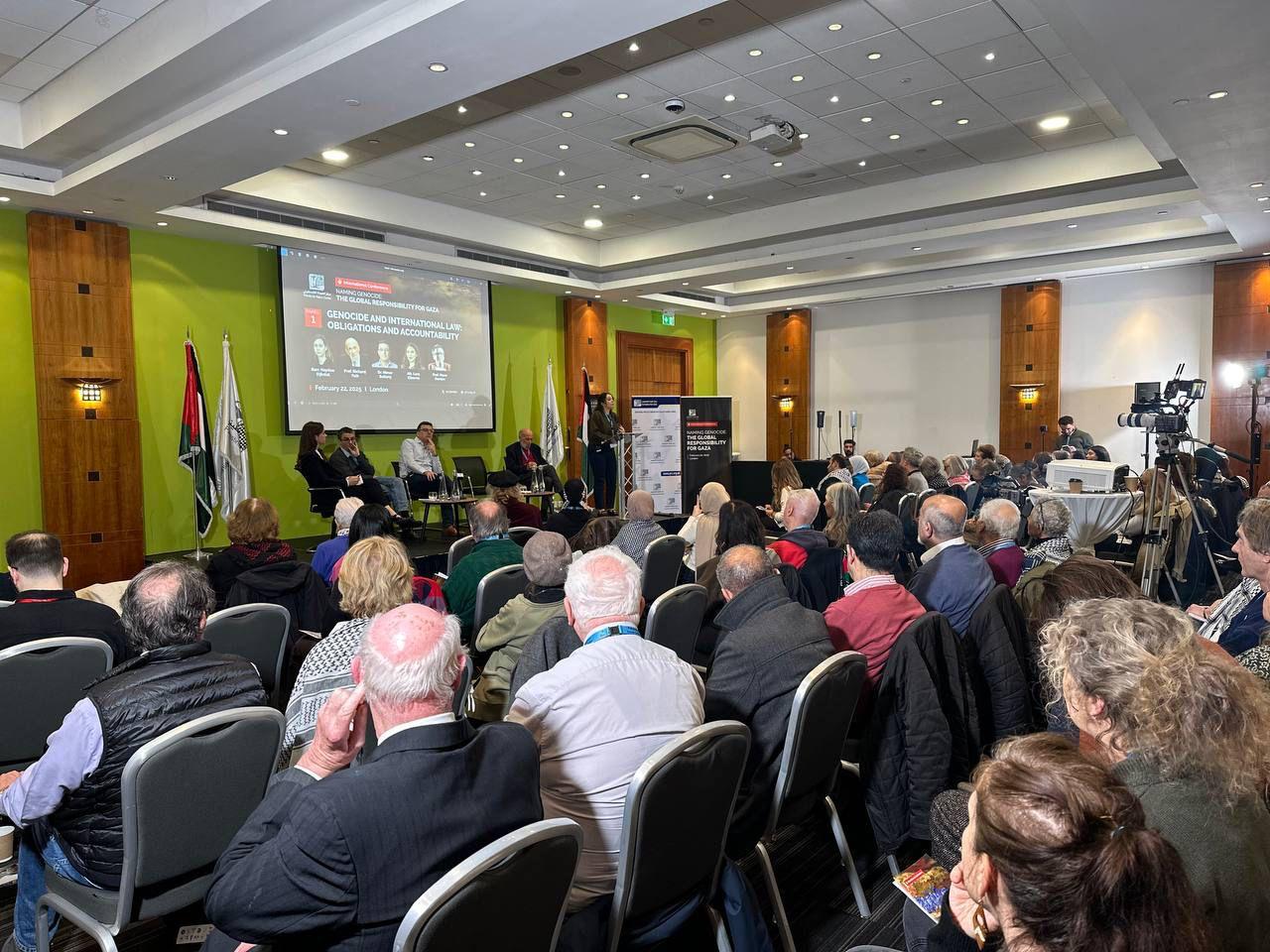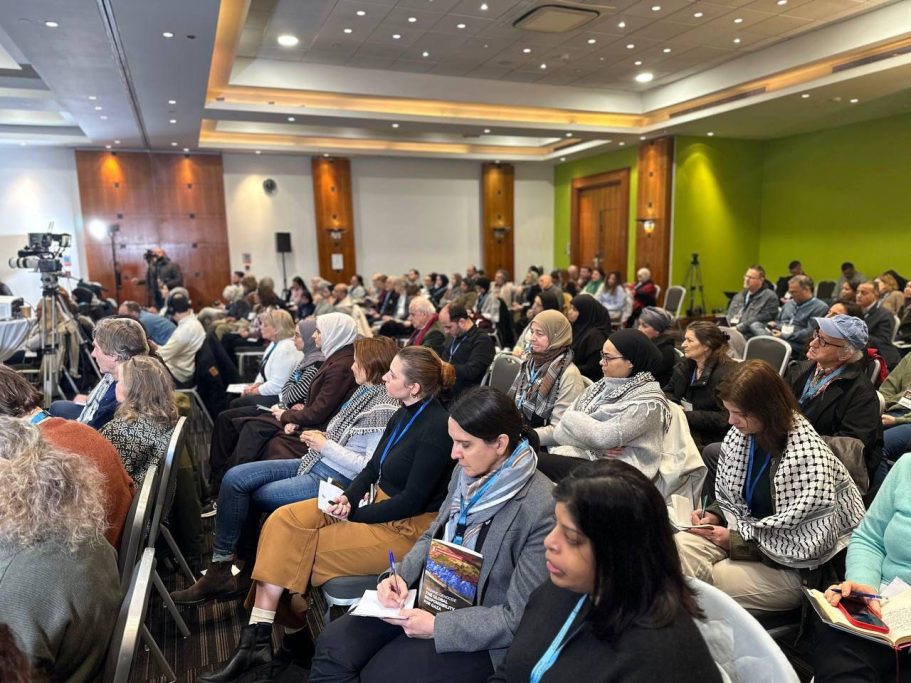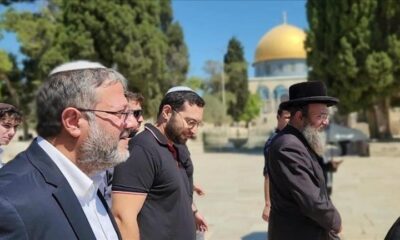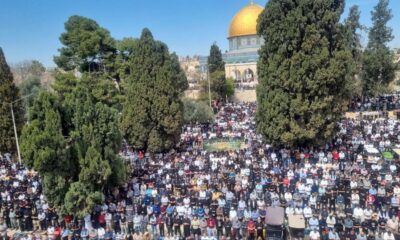Breaking News
PRC: The international community must take concrete steps to hold Israel accountable

LONDON (Palestine Foundation Information Center) In light of the catastrophic consequences of Israel’s assault on Gaza since 7 October 2023, the Palestinian Return Center (PRC) in the UK convened its annual conference under the title “Genocide: The Global Responsibility Towards Gaza.”
The event brought together a distinguished group of academics, medical experts, and media professionals from around the world to discuss the impact of war and siege on Gaza’s residents and highlight Palestinian resilience strategies in a full day of panel discussions.
Panel One: Genocide in International Law – Challenges of Accountability and Double Standards
Speakers:
• Chair: Heidi Degermestål – International Criminal and Human Rights Lawyer
• Prof. Richard Falk – Professor Emeritus of International Law at Princeton University, Chair of the Board of Trustees at Euro-Med Human Rights Monitor
• Dr. Nimer Sultany – Reader in Public Law, SOAS University of London
• Prof. Neve Gordon – Professor of International Law, Queen Mary University of London
• Lara Alborno – Palestinian-American Lawyer Specializing in International Law
Key Discussions:
Chairing the session, Heidi Degermestål emphasized the gravity of genocide under international law, highlighting the legal obligations set by the 1948 Genocide Convention. She pointed out the political obstacles hindering the effective implementation of international law.
• Prof. Richard Falk underscored the gap between the declared principles of international law and its actual application, particularly in cases involving global superpowers. He criticized the selective enforcement of legal frameworks, noting that international law is often manipulated to reinforce domination rather than uphold justice. Falk particularly highlighted the U.S.’s use of veto power to shield Israel from accountability.
• Dr. Nimer Sultany addressed the double standards in prosecuting genocide, comparing the swift legal action against Myanmar with the international community’s reluctance to act against Israel. He cited Gaza’s unprecedented destruction, with over 70,000 tons of explosives used, surpassing the Allied bombings of London during World War II.
• Prof. Neve Gordon discussed how international law is reinterpreted to justify attacks on civilians. He examined how hospitals and schools are reclassified as military targets and how the “human shield” argument is exploited to shift blame onto victims.
• Lara Alborno emphasized the consensus among international law experts that Israel’s actions in Gaza constitute genocide. She referenced scholars like Prof. Ross Sigal, who described Israeli policies as a “textbook case of genocide.” Alborno also criticized Western media for framing the issue as a “legal debate” rather than recognizing the clear evidence of mass atrocities.
Conclusion:
The session highlighted the significant challenges in enforcing international law regarding genocide, particularly in the face of political double standards. Calls for accountability continue to grow as the world witnesses the ongoing atrocities against Palestinians.
Panel Two: “Voices from Gaza” – Firsthand Accounts of Reality and Resilience
Speakers:
• Dr. Mads Gilbert – Anaesthesiologist and Professor of Emergency Medicine, University of Tromsø, Norway
• Dr. Youssef Abu Rish – Minister of Health, Gaza
• Dr. Ahmed Makhlalati – Academic and Palestinian Affairs Researcher
• Ahmad Al-Nawq – Palestinian Journalist Covering Gaza
• Dr. Wissam Amer – Dean, Faculty of Communication and Languages, Gaza University
Key Discussions:
Chaired by Dr. Mads Gilbert, the panel featured first-hand accounts of Gaza’s humanitarian catastrophe, the collapse of its healthcare system, and the media’s role in documenting war crimes.
• Dr. Gilbert opened the session with a sobering overview of the devastation in Gaza:
o 69% of infrastructure destroyed
o 80% of commercial facilities wiped out
o 68% of road networks damaged
o 91% of the population facing food insecurity
o 1.9 million people in urgent need of shelter
He stressed that Gaza’s healthcare system is in total collapse, with 22 out of 38 hospitals out of service, and over 500 medical workers killed. He described the situation as a systematic genocide targeting the very means of survival in Gaza.
• Dr. Youssef Abu Rish discussed the severe shortages of medicines and medical equipment, emphasizing that hospitals like Al-Shifa and the Indonesian Hospital remain operational due to local efforts and donations despite continuous Israeli attacks. He warned of an imminent humanitarian catastrophe if immediate action is not taken to lift the siege and allow medical aid.
• Journalist Ahmad Al-Nawq highlighted the systematic targeting of journalists to suppress truthful reporting. He referenced the deaths of prominent Palestinian media figures like Dr. Maisar Al-Ainyas and poet Ziad Al-Aryani, who became symbols of resistance and hope. Al-Nawq urged for greater international support for independent journalism.
• Dr. Wissam Amer spoke about the impact of war on education, noting that over 50% of educational institutions have been bombed, leading to the suspension of education across much of Gaza. Despite the devastation, online education continues as an act of resistance.
Conclusion:
The session emphasized that Palestinians need more than sympathy—they need tangible action, including political pressure, legal advocacy, and reconstruction support. Speakers urged the international community to rise to the moral test posed by Gaza’s ongoing crisis.
Panel Three: “International Solidarity – Turning Advocacy into Action”
Speakers:
• Dr. Nadia Naser-Najjab – Senior Lecturer in Palestine Studies, European Center for Palestine Studies (ECPS), University of Exeter
• Gracia Caricchia – Deputy Regional Director for the Middle East & North Africa, Head of Israel-Palestine Desk, Amnesty International
• Mira Nasir – Legal Officer, International Center of Justice for Palestine (ICJP)
• Nuviret Kalra – Digital Content Producer, Code Pink
Key Discussions:
Chaired by Dr. Hande Terez from Keele University, the panel explored how global solidarity can translate into real action through legal measures, boycott campaigns, and media advocacy.
• Dr. Nadia Naser-Najjab stressed that Palestine is a global issue, citing international complicity in Israel’s colonial project since the 1917 Balfour Declaration. She criticized so-called “soft normalization” initiatives that attempt to dilute Palestinian resistance under the guise of “dialogue and coexistence.”
• Gracia Caricchia of Amnesty International presented key findings from the organization’s genocide report on Gaza, highlighting that the campaign had received 1.25 million social media engagements, 365,000 petition signatures, and actions in 21 countries.
• Mira Nasir detailed the legal efforts to hold Israel accountable, including:
o Filing official complaints with Scotland Yard against British and Israeli officials for war crimes.
o Lawsuits against the UK government over arms sales to Israel.
o Calls for an immediate arms embargo on Israel due to its violations of international law.
• Nuviret Kalra emphasized the power of economic boycott campaigns, exposing corporations like McDonald’s, which provided free meals to Israeli soldiers during the war. She highlighted how UK arms exports account for 3% of Israel’s military imports, urging greater economic pressure on complicit entities.
Conclusion:
The panel called for sustained political, legal, and economic action to support Palestinian rights, emphasizing:
• Increased political and diplomatic pressure on governments supporting Israel.
• Legal prosecutions of Israeli war criminals at national and international levels.
• Expanding BDS (Boycott, Divestment, and Sanctions) campaigns against companies complicit in Israeli war crimes.
• Strengthening independent media efforts to counter Israeli disinformation.
Final Message: Justice Requires Action
Speakers stressed that justice will not be achieved through rhetoric alone. The international community must take concrete steps to hold Israel accountable and support the Palestinian struggle for freedom and dignity.


Al-Quds International: Israel wages liquidation war on Jerusalem parallel to the genocide in Gaza

Settlers uproot olive and grape trees in Ramallah and Nablus





